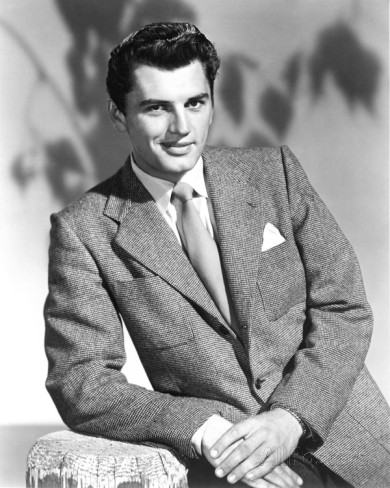Edmund Purdom (Edmund Anthony Cutlar Purdom)

Purdom was born in Welwyn Garden City, Hertfordshire, England and educated at St. Augustine’s Abbey School, Ramsgate, Kent, then by the Jesuits at St. Ignatius Grammar School and Welwyn Garden City Grammar School. He began his acting career in 1946 by joining the Northampton Repertory Company, appearing in productions which included Romeo and Juliet and Molière’s The Imaginary Invalid. Followed by two years of military service where he joined the Army Pool of Artists. He then joined the Royal Shakespeare Theatre at Stratford-upon-Avon. In 1951–52, Purdom appeared in small roles with the Laurence Olivier/Vivien Leigh company on Broadway in Shakespeare’s Antony and Cleopatra and Shaw’s Caesar and Cleopatra when his good looks brought him to the attention of Hollywood. 20th Century Fox tested him for a role in My Cousin Rachel and MGM offered him a small role in Rhapsody which he turned down to work at Warner Bros. But Warners lost interest in him. His appearance in small roles in Titanic and Julius Caesar led to his being cast in the leading role opposite Ann Blyth in the Metro-Goldwyn-Mayer musical The Student Prince in 1954, a part originally intended for Mario Lanza, whose disagreement with director Curtis Bernhardt over the way a certain song was to be sung had led to his dismissal by MGM. (The film was subsequently directed by Richard Thorpe.) Purdom lip-synched to Lanza’s singing voice. At this time, he acquired the nickname “the replacement star” because his other best-remembered role was taking over for Marlon Brando as the title character in The Egyptian, 20th Century-Fox’s most lavish production of 1954. In the same year, he appeared in another MGM musical, Athena, opposite his future wife Linda Christian, Jane Powell and Debbie Reynolds. He then played the title role in the biblical epic The Prodigal, MGM’s most lavish production of 1955. He partnered with Ann Blyth again in The King’s Thief (1955) in which he and Blyth were supported by David Niven, George Sanders and Roger Moore. After that, his career as a major film star ran out of steam, with the exception of some rare cameo appearances, such as The Yellow Rolls-Royce in 1964.
On television he starred as Marco del Monte in Sword of Freedom (1958), a swashbuckler made for ITC Entertainment. Purdom moved to Rome, Italy, where he first played parts in “sword and sandal” epics and lived there for the rest of his life. He continued to work extensively in Italian B-films, on television and as a voice dubbing actor for many years (recording dialogue translated from Italian into English for sales of Italian films in English-speaking countries). In 1984, he directed his first and only film, Don’t Open ‘Til Christmas. He was also very active as a music recording engineer, including work on the soundtracks of such films as The Bible, as well as many classical concerts in Florence and Vienna. He is also credited for devising a technique transferring monaural sound to stereo. He narrated a popular short documentary on the life of Padre Pio. He also narrated the Christian documentary, 7 Signs of Christ’s Return. Purdom died from heart failure on 1 January 2009, in Rome. Purdom was married four times and divorced three times: his first three wives, all divorced, were Anita (Tita) Philips (or Phillips), the mother of his children; actress Linda Christian in 1962, ex-wife of Tyrone Power; and Alicia Darr, of Polish extraction. In 2000 he married his fourth wife, the photographer Vivienne Purdom. His daughter Lilan Purdom is a journalist with the French television channel TF1.
Born
- December, 19, 1924
- United Kingdom
- Welwyn Garden City, Hertfordshire, England
Died
- January, 01, 2009
- Rome, Italy
Cause of Death
- heart failure
Cemetery
- Campo Cestio
- Rome, Italy


